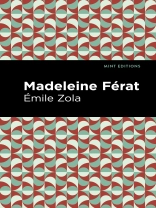Madeleine Férat (1868) is a novel by French author Émile Zola. Following the success of his third novel, Thérèse Raquin (1867), Zola published Madeleine Férat to lukewarm critical acclaim. Intent on exploring taboo and the lives of people on the edge of society, Zola crafts a narrative capable of illuminating the human condition while humanizing those typically disdained by the literary elite. In 1920, Madeleine Férat was adapted into an Italian silent film starring Francesca Bertini. To anyone who makes their acquaintance, Guillaume and Madeleine have a storybook romance—marriage, a child, the inheritance of a beautiful villa and a sizeable fortune; these things and more bless their family from the start and promise a lengthy, healthy relationship. As Madeleine adjusts to the comforts and curiosities of married life, she finds herself emboldened to share aspects of her personal history with Guillaume. One night, she decides to tell him a story involving a former lover, sparing no details on their sexual relationship. To her horror, she discovers that her lover was once Guillaume’s best friend. Rather than amusing her husband, she shatters their idyllic existence, plunging him into doubt and despair while exposing herself to his hidden vindictive side. Madeleine Férat is a story of love, secrets, and the false promise of modern life. Written at the very beginning of Zola’s career, it shows the innerworkings of a young mind interested in subjects too often ignored by writers, a mind whose guiding principle is truth and truth alone. This edition of Émile Zola’s Madeleine Férat is a classic work of French literature reimagined for modern readers.
Since our inception in 2020, Mint Editions has kept sustainability and innovation at the forefront of our mission. Each and every Mint Edition title gets a fresh, professionally typeset manuscript and a dazzling new cover, all while maintaining the integrity of the original book.
With thousands of titles in our collection, we aim to spotlight diverse public domain works to help them find modern audiences. Mint Editions celebrates a breadth of literary works, curated from both canonical and overlooked classics from writers around the globe.
About the author
Émile Zola (1840-1902) was a French novelist, journalist, and playwright. Born in Paris to a French mother and Italian father, Zola was raised in Aix-en-Provence. At 18, Zola moved back to Paris, where he befriended Paul Cézanne and began his writing career. During this early period, Zola worked as a clerk for a publisher while writing literary and art reviews as well as political journalism for local newspapers. Following the success of his novel Thérèse Raquin (1867), Zola began a series of twenty novels known as Les Rougon-Macquart, a sprawling collection following the fates of a single family living under the Second Empire of Napoleon III. Zola’s work earned him a reputation as a leading figure in literary naturalism, a style noted for its rejection of Romanticism in favor of detachment, rationalism, and social commentary. Following the infamous Dreyfus affair of 1894, in which a French-Jewish artillery officer was falsely convicted of spying for the German Embassy, Zola wrote a scathing open letter to French President Félix Faure accusing the government and military of antisemitism and obstruction of justice. Having sacrificed his reputation as a writer and intellectual, Zola helped reverse public opinion on the affair, placing pressure on the government that led to Dreyfus’ full exoneration in 1906. Nominated for the Nobel Prize in Literature in 1901 and 1902, Zola is considered one of the most influential and talented writers in French history.












